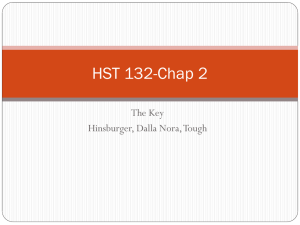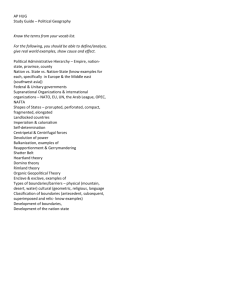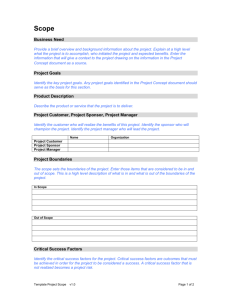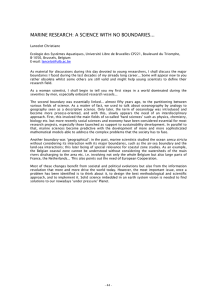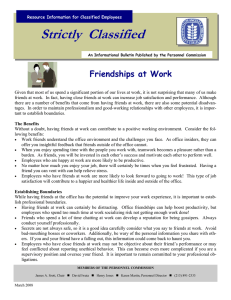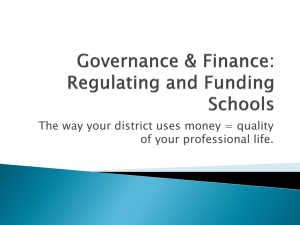C H P
advertisement
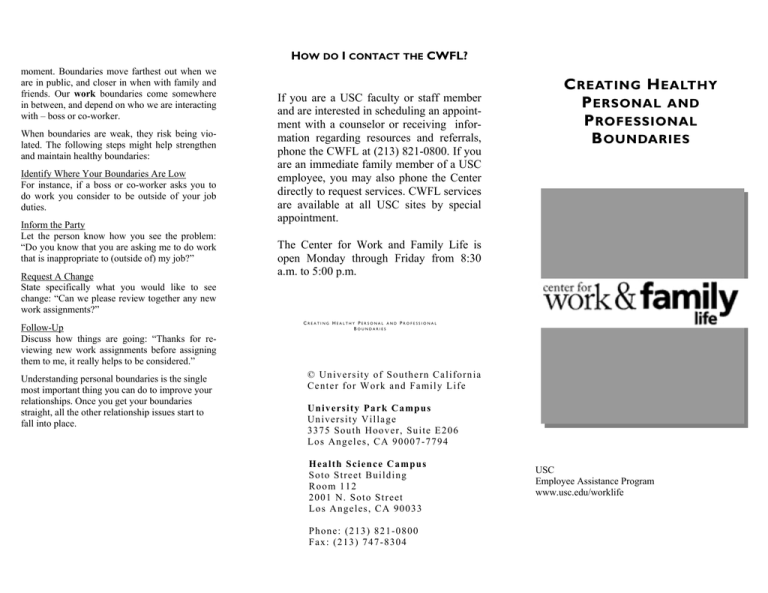
HOW DO I CONTACT THE CWFL? moment. Boundaries move farthest out when we are in public, and closer in when with family and friends. Our work boundaries come somewhere in between, and depend on who we are interacting with – boss or co-worker. When boundaries are weak, they risk being violated. The following steps might help strengthen and maintain healthy boundaries: Identify Where Your Boundaries Are Low For instance, if a boss or co-worker asks you to do work you consider to be outside of your job duties. Inform the Party Let the person know how you see the problem: “Do you know that you are asking me to do work that is inappropriate to (outside of) my job?” Request A Change State specifically what you would like to see change: “Can we please review together any new work assignments?” Follow-Up Discuss how things are going: “Thanks for reviewing new work assignments before assigning them to me, it really helps to be considered.” Understanding personal boundaries is the single most important thing you can do to improve your relationships. Once you get your boundaries straight, all the other relationship issues start to fall into place. If you are a USC faculty or staff member and are interested in scheduling an appointment with a counselor or receiving information regarding resources and referrals, phone the CWFL at (213) 821-0800. If you are an immediate family member of a USC employee, you may also phone the Center directly to request services. CWFL services are available at all USC sites by special appointment. C REATING H EALTHY P ERSONAL AND P ROFESSIONAL B OUNDARIES The Center for Work and Family Life is open Monday through Friday from 8:30 a.m. to 5:00 p.m. CREATING HEALTHY PERSONAL AND PROFESSIONAL BOUNDARIES © Un iv ersity of Sou thern Californ ia Cen ter for W ork and Family Life Univ ersity Pa rk Campus Un iv ersity Village 3375 Sou th Hoov er, Su ite E206 Lo s Ang e les, CA 90007-7794 H ea lt h S c ien c e C a m pus Soto Street Building Roo m 112 2001 N. Soto Street Lo s Ang e les, CA 90033 Phon e: (213) 821 -0800 Fax : (213 ) 747-8304 USC Employee Assistance Program www.usc.edu/worklife C REATING H EALTHY P ERSONAL Having clear boundaries is essential to a healthy, balanced lifestyle. The purpose of having boundaries is to protect and take care of ourselves. A boundary or limit is how far we can go with comfort in a relationship. It delineates where I and my physical and psychological space end and where you and yours begins. Healthy boundaries are not set by others, are not hurtful or harmful, and are not controlling or manipulating. We need to be able to tell other people when they are acting in ways that are not acceptable to us. A first step in this process is knowing that we have a right, a duty, to ourselves to protect and defend ourselves- to set boundaries on how we allow others to treat us. Boundaries impact all areas of our lives. Setting boundaries is critical if you want to increase your personal productivity and maintain balance. Setting boundaries, mental, physical, emotional, is a way of defining who you are… what you’re all about…. what’s acceptable to you…. and what’s not. You set limits when you express feelings, opinions, desires, and needs – bringing problems out into the open, knowing it may cause conflict. By expressing your individuality in the world you balance respect for others with respect for yourself. Mental and emotional boundaries include many important aspects of our lives. Some of these are our beliefs, thoughts, ideas, feelings, decisions, and choices. For example, have you even been told what you “should” believe, think, decide or choose? If so, then your boundaries may have been invaded at that time. With awareness of your own inner life, and with clear boundaries and limits, you can handle or at AND P ROFESSIONAL B OUNDARIES times even prevent such a boundary invasion. For Instance: Has anyone ever accused you of or blamed you for something that they did? How did you feel when they did that? Has anyone every drained your energy so much that you neglected your own needs? You may have experienced a lack of awareness of your inner life, including your own needs. You may have been people pleasing to the detriment of your own self. Have you ever had a heated exchange with someone, only to come up with all the things you wished you had said, two hours later? That occurs when you don’t set proper limits and take care of business when it’s right in front of you. Physical Boundaries We all have an amount of physical space we need around us to feel comfortable – our “comfort zone”. This is different for each person, and varies from culture to culture, but you know what it is. If someone steps inside your comfort zone, they have violated your physical boundary, and made you feel uncomfortable. To take it a step further, stepping into someone’s physical space feels threatening, and can be defined as physical abuse. Emotional Boundaries People also have emotional boundaries. This comprises everything about who they are, what they do, what they like, their past, their family and friends, their looks, their personality, where they went to school, or the house they live in. Making remarks about any of these things – anything that has to do with “who a person is” – is an emotional boundary violation. Intentions don’t matter when it comes to trespassing someone’s emotional boundaries; only the effect the words had on the person matter. Any remarks that start with “You” are probably trespassing on someone’s emotional boundaries. Language is very powerful, words can be destructive. Refining the language you use is a very important part of learning to respect other people’s boundaries. Boundaries and Family Members Boundaries tend to be more lax among family members – but, really, should they be? Unless we are specifically asked to comment on something that falls within someone’s personal emotional boundaries, we are trespassing on their territory and risk doing emotional damage and causing relationship problems and conflicts. Remember, it doesn’t matter what the intention is, if you trespass on someone’s boundaries, they have a right to be upset. The home is probably the MOST IMPORTANT place to exercise a healthy respect for boundaries since so much of our happiness depends on the smooth functioning of these relationships. Boundaries and Manipulation and Control Emotional boundary violations can be construed as verbal and emotional abuse. You can emotionally abuse someone without OVERTLY trespassing a boundary. In fact, very quiet attempts to manipulate someone –to control someone, their emotions or behavior – constitute boundary violations. Boundaries at Work For the most part, good boundaries ward off disrespectful treatment. You might compare a healthy boundary to a lung, expanding and contracting naturally to meet the needs of the present
